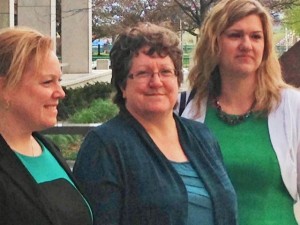MN child care businesses challenge union drive in federal appeal

By Tom Steward | Watchdog Minnesota Bureau
ST. PAUL, Minn. — It may be National Small Business Week, but a group of Minnesota women small business owners were defending, more than promoting, their home-based enterprises in the Eighth Circuit Court of Appeals in St. Paul.
After temporarily blocking a union drive for child-care providers in September, a three-judge appellate panel heard oral arguments in Parrish v. Dayton, in which 12 licensed family child-care providers squared off against Gov. Mark Dayton and the American Federation of State, County and Municipal Employees union.
“I’m tired of this state and some of our politicians not looking at family child-care providers as small businesses,” said Jennifer Parrish, a Rochester licensed family child care provider and plaintiff. “We pay self-employment tax, we own and run these businesses like any other small business, but these unions and politicians continually refer to us as low-wage workers. It’s offensive.”
At issue is whether Minnesota can classify 12,700 home-based child-care provider business owners who may serve some subsidized families “as state employees for the limited purpose of applying Minnesota’s Public Employment Labor Relations Act,” AFSCME court documents state.
The passage of the controversial Family Child Care Providers Representation Act this past May cleared the way for AFSCME to organize child-care providers and potentially tap into $211 million in annual taxpayer subsidies under the Minnesota Child Care Assistance Program.
PRO-UNION PROVIDERS: AFSCME hopes to form provider union under MN law classifying child care business owners as state employees for purposes of collective bargaining.
“It creates a limited employment relationship with the State for purposes of possible union representation regarding, in particular, the State subsidy,” said Alan Gilbert, Minnesota’s solicitor general, in the state’s legal brief.
The providers claim Minnesota violated their First Amendment rights of freedom of association by acknowledging a union as their sole representative in collective bargaining talks.
“This legal challenge is another attempt by right-wing extremists to deny people their rights,” said Jennifer Munt, spokeswoman for AFSCME Council 5. “Justice won’t be served until child-care providers can vote on whether they want a union.”
Before AFSCME submitted the necessary 500 provider signatures to trigger an election, however, the 8th Circuit Court of Appeals issued an injunction in September.
The union drive continues among both licensed and unlicensed providers. The process for an election remains on hold, however, pending a U.S. Supreme Court decision on a case raising related public employee union issues involving Illinois home-care assistants (Harris v. Quinn).
MN UNION DRIVE MAY HINGE SUPREME COURT CASE: Bill Messenger of the National Right to Work Foundation Legal Defense Foundation argued both the Harris v. Quinn SCOTUS case and Parrish v. Dayton in MN.
“If it is held constitutional for Minnesota to impose an exclusive representative on small business owners and family members merely because they serve children enrolled in a public-aid program, then vast swaths of the population could also be collectivized based on their services to public-aid recipients,” states Bill Messenger, a National Right to Work Legal Defense Foundation attorney, in court documents on behalf of the providers.
“This includes government contractors, those serving Medicaid or Medicare beneficiaries, or anyone else whose services are paid for by a government program,” said Messenger, who also recently argued the Supreme Court case that will likely affect the outcome of the St. Paul hearing.
Attorneys for the state and AFSCME made the case that providers challenged the constitutionality of the state law prematurely. Since AFSCME hasn’t submitted a petition with 500 signatures to the state, much less held an election, the union hopes to persuade the federal appellate court to lift the injunction and allow the organizing drive aimed at a secret mail ballot election to proceed.
“The alleged constitutional injury depends entirely on whether a union will be able to demonstrate sufficient support among the providers to obtain a representation election, and ultimately whether a majority will vote in favor of union representation. These events, as the district court correctly held, might or might not ever occur,” according to AFSCME’s legal brief.
AFSCME attorney John West told the court unions lose about one-third of representation elections. “I hope the union wins the election,” said West. “I wish it were certain, but it’s not.”
Two of the three appellate judges sparred frequently with attorneys on both sides in the 40-minute hearing. Court observers anticipate a decision on the Minnesota case in two or three months, following what could be a precedent-setting Supreme Court ruling in Harris v. Quinn.
Contact Tom Steward at tsteward@watchdog.org.







